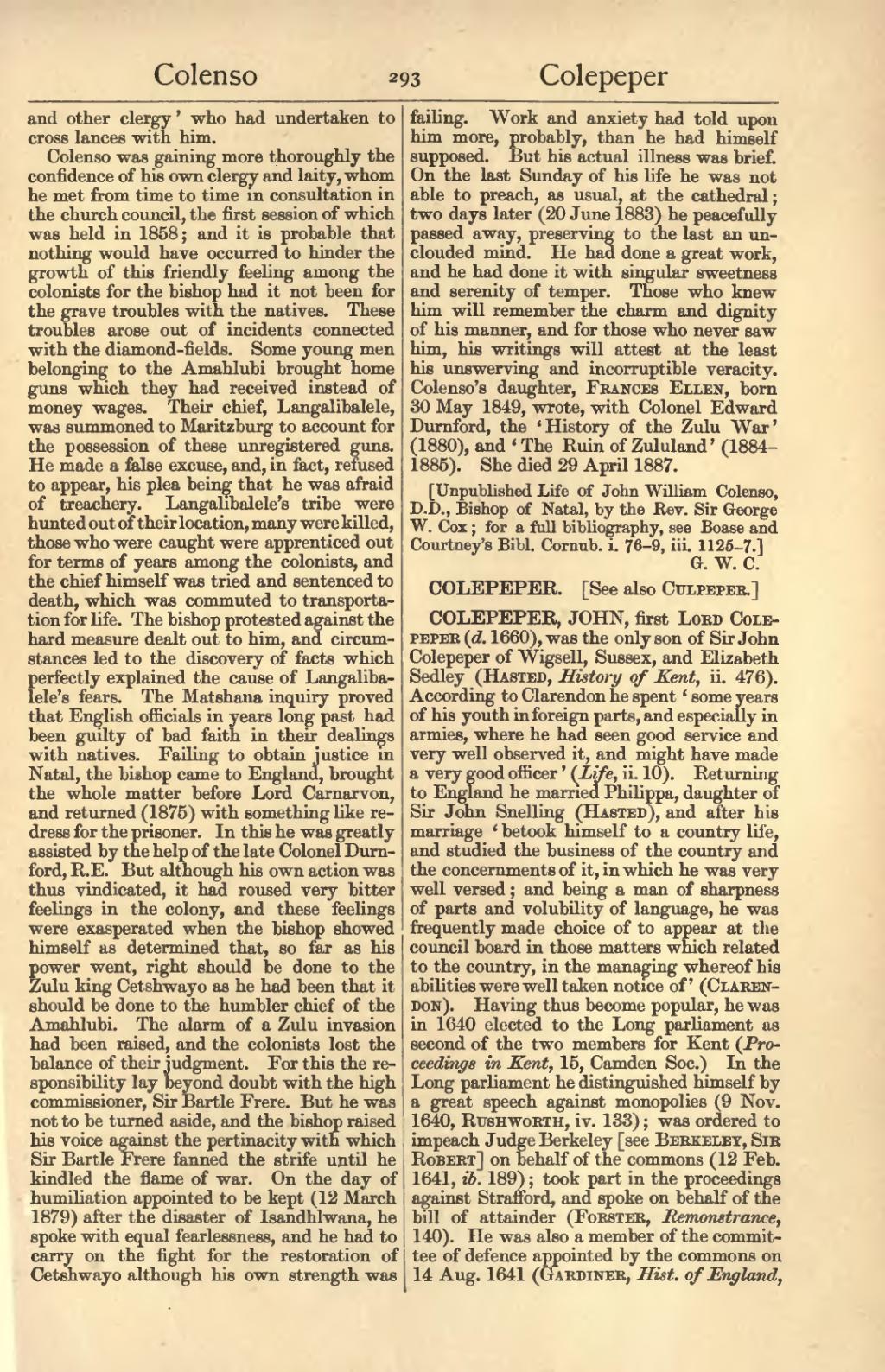and other clergy' who had undertaken to cross lances with him.
Colenso was gaining more thoroughly the confidence of his own clergy and laity, whom he met from time to time in consultation in the church council, the first session of which held in 1858; and it is probable that nothing would have occurred to hinder the growth of this friendly feeling among the colonists for the bishop had it not been for troubles with the natives. These troubles arose out of incidents connected with the diamond-fields. Some young men belonging to the Amahlubi brought home guns which they had received instead of money wages. Their chief, Langalibalele, was summoned to Maritzburg to account for the possession of these unregistered guns. He made a false excuse, and, in fact, refused to appear, his plea being that he was afraid of treachery. Langalibalele's tribe were hunted out of their location, many were killed, those who were caught were apprenticed out for terms of years among the colonists, and the chief himself was tried and sentenced to death, which was commuted to transportation for life. The bishop protested against the hard measure dealt out to him, and circumstances led to the discovery of facts which perfectly explained the cause of Langalibalele's fears. The Matshana inquiry proved that English officials in years long past had been guilty of bad faith in their dealings with natives. Failing to obtain justice in Natal, bishop came to England, brought the whole matter before Lord Carnarvon, and returned (1875) with something like redress for the prisoner. In this he was greatly assisted by the help of the late Colonel Durnford, R.E. But although his own action was thus vindicated, it had roused very bitter feelings in the colony, and these feelings were exasperated when the bishop showed himself as determined that, so far as his power went, right should be done to the Zulu king Cetshwayo as he had been that it should be done to the humbler chief of the Amahlubi. The alarm of a Zulu invasion had been raised, and the colonists lost the balance of their judgment. For this the responsibilitylay beyond doubt with the high commissioner, Sir Bartle Frere. But he was not to be turned aside, and the bishop raised his voice against, the pertinacity with which Sir Bartle Frere fanned the strife until he kindled the flame of war. On the day of humiliation appointed to be kept (13 March 1879) after the disaster of Isandhlwana, he spoke with equal fearlessness, and he had carry on the fight for the restoration of Cetahwayo although his own strength was failing. Work and anxiety had told upon him more, probably, than he had himself supposed. But his actual illness was brief. On the last Sunday of his life he was not able to preach, as usual, at the cathedral; two days later (20 June 1883) he peacefully passed away, preserving to the last an unclouded mind. He had done a great work, and he had done it with singular sweetness and serenity of temper. Those who knew him will remember the charm and dignity of his manner, and for those who never saw him, his writings will attest at the least his unswerving and incorruptible veracity. Colenso's daughter, Frances Ellen, born 30 May 1849, wrote, with Colonel Edward Durnford, the 'History of the Zulu War' (1880), and 'The Ruin of Zululand' (1884-1886). She died 29 April 1887.
[Unpublished Life of John William Colenso, D.D., Bishop of Natal, by the Rev. Sir George W. Cox; for a full bibliography, see Boase and Courtney's Bibl. Cornub. i. 76-9, iii. 1126-7.]
COLEPEPER. [See also Culpapar.]
COLEPEPER, JOHN, first Lord Colepeper (d. 1660), was the only son of Sir John Colepeper of Wigsell, Sussex, and Elisabeth Sedley (Hasted, History of Kent, ii. 476). According to Clarendon he spent 'some years of bis youth in foreign parts, and especially in armies, where he had seen good service and very well observed it, and might have made a very good officer' (Life, ii. 10). Returning to England be married Philippa, daughter of Sir John Snelling (Hastad), and after his marriage 'betook himself to a country life, and studied the business of the country and the concernments of it, in which he was very well versed; and being a man of sharpness of parts and volubility of language, he was frequently made choice of to appear at the council board in those matters which related to the country, in the managing whereof his abilities were well taken notice of' (Clarendon). Having thus become popular, he was in 1640 elected to the Long parliament as second of the two members fur Kent (Proceedings in Kent, 15, Camden Soc.) In the Long parliament he distinguished himself by a great speech against monopolies (9 Nov. 1640, Rushworth, iv. 183); was ordered to impeach Judge Berkeley [see Berkeley, SIr Robert] on behalf of the commons (12 Feb. 1641, ib. 189); took part in the proceedings against Stafford, and spoke on behalf of the bill of attainder (Forster, Remonstrance, 140). He was also a member of the committees of defence appointed by the commons on 14 Aug. 1641 (Gardiner, Hist. of England,
